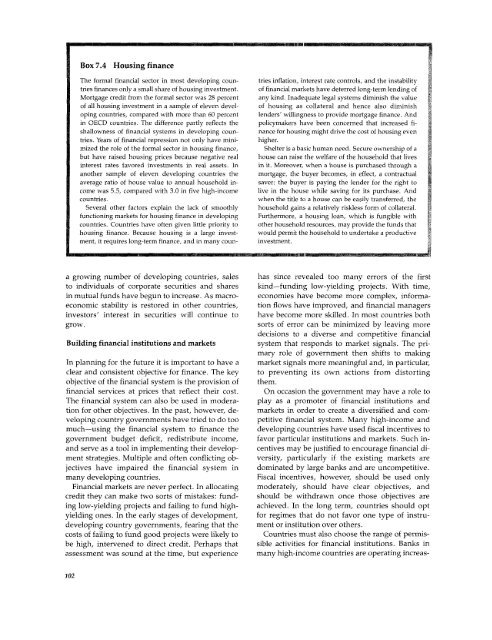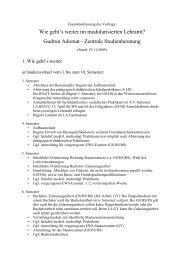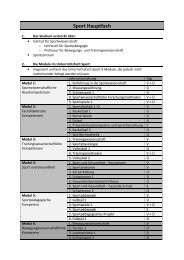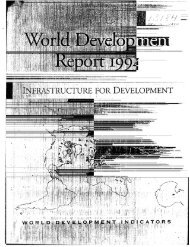Financial systems and development
Financial systems and development
Financial systems and development
You also want an ePaper? Increase the reach of your titles
YUMPU automatically turns print PDFs into web optimized ePapers that Google loves.
Box 7.4<br />
Housing finance<br />
The formal financial sector in most developing coun- tries inflation, interest rate controls, <strong>and</strong> the instability<br />
tries finances only a small share of housing investment. of financial markets have deterred long-term lending of<br />
Mortgage credit from the formal sector was 28 percent any kind. Inadequate legal <strong>systems</strong> diminish the value<br />
of all housing investment in a sample of eleven devel- of housing as collateral <strong>and</strong> hence also diminish<br />
oping countries, compared with more than 60 percent lenders' willingness to provide mortgage finance. And<br />
in OECD countries. The difference partly reflects the policymakers have been concerned that increased fishallowness<br />
of financial <strong>systems</strong> in developing coun- nance for housing might drive the cost of housing even<br />
tries. Years of financial repression not only have mini- higher.<br />
mized the role of the formal sector in housing finance, Shelter is a basic human need. Secure ownership of a<br />
but have raised housing prices because negative real house can raise the welfare of the household that lives<br />
interest rates favored investments in real assets. In in it. Moreover, when a house is purchased through a<br />
another sample of eleven developing countries the mortgage, the buyer becomes, in effect, a contractual<br />
average ratio of house value to annual household in- saver: the buyer is paying the lender for the right to<br />
come was 5.5, compared with 3.0 in five high-income live in the house while saving for its purchase. And<br />
countries. when the title to a house can be easily transferred, the<br />
Several other factors explain the lack of smoothly household gains a relatively riskless form of collateral.<br />
functioning markets for housing finance in developing Furthermore, a housing loan, which is fungible with<br />
countries. Countries have often given little priority to other household resources, may provide the funds that<br />
housing finance. Because housing is a large invest- would permit the household to undertake a productive<br />
ment, it requires long-term finance, <strong>and</strong> in many coun- investment.<br />
a growing number of developing countries, sales has since revealed too many errors of the first<br />
to individuals of corporate securities <strong>and</strong> shares kind-funding low-yielding projects. With time,<br />
in mutual funds have begun to increase. As macro- economies have become more complex, informaeconomic<br />
stability is restored in other countries, tion flows have improved, <strong>and</strong> financial managers<br />
investors' interest in securities will continue to have become more skilled. In most countries both<br />
grow.<br />
sorts of error can be minimized by leaving more<br />
decisions to a diverse <strong>and</strong> competitive financial<br />
Building financial institutions <strong>and</strong> markets<br />
system that responds to market signals. The primary<br />
role of government then shifts to making<br />
In planning for the future it is important to have a market signals more meaningful <strong>and</strong>, in particular,<br />
clear <strong>and</strong> consistent objective for finance. The key to preventing its own actions from distorting<br />
objective of the financial system is the provision of them.<br />
financial services at prices that reflect their cost. On occasion the government may have a role to<br />
The financial system can also be used in modera- play as a promoter of financial institutions <strong>and</strong><br />
tion for other objectives. In the past, however, de- markets in order to create a diversified <strong>and</strong> comveloping<br />
country governments have tried to do too petitive financial system. Many high-income <strong>and</strong><br />
much-using the financial system to finance the developing countries have used fiscal incentives to<br />
government budget deficit, redistribute income, favor particular institutions <strong>and</strong> markets. Such in<strong>and</strong><br />
serve as a tool in implementing their develop- centives may be justified to encourage financial diment<br />
strategies. Multiple <strong>and</strong> often conflicting ob- versity, particularly if the existing markets are<br />
jectives have impaired the financial system in dominated by large banks <strong>and</strong> are uncompetitive.<br />
many developing countries.<br />
Fiscal incentives, however, should be used only<br />
<strong>Financial</strong> markets are never perfect. In allocating moderately, should have clear objectives, <strong>and</strong><br />
credit they can make two sorts of mistakes: fund- should be withdrawn once those objectives are<br />
ing low-yielding projects <strong>and</strong> failing to fund high- achieved. In the long term, countries should opt<br />
yielding ones. In the early stages of <strong>development</strong>, for regimes that do not favor one type of instrudeveloping<br />
country governments, fearing that the ment or institution over others.<br />
costs of failing to fund good projects were likely to Countries must also choose the range of permisbe<br />
high, intervened to direct credit. Perhaps that sible activities for financial institutions. Banks in<br />
assessment was sound at the time, but experience many high-income countries are operating increas-<br />
102
















